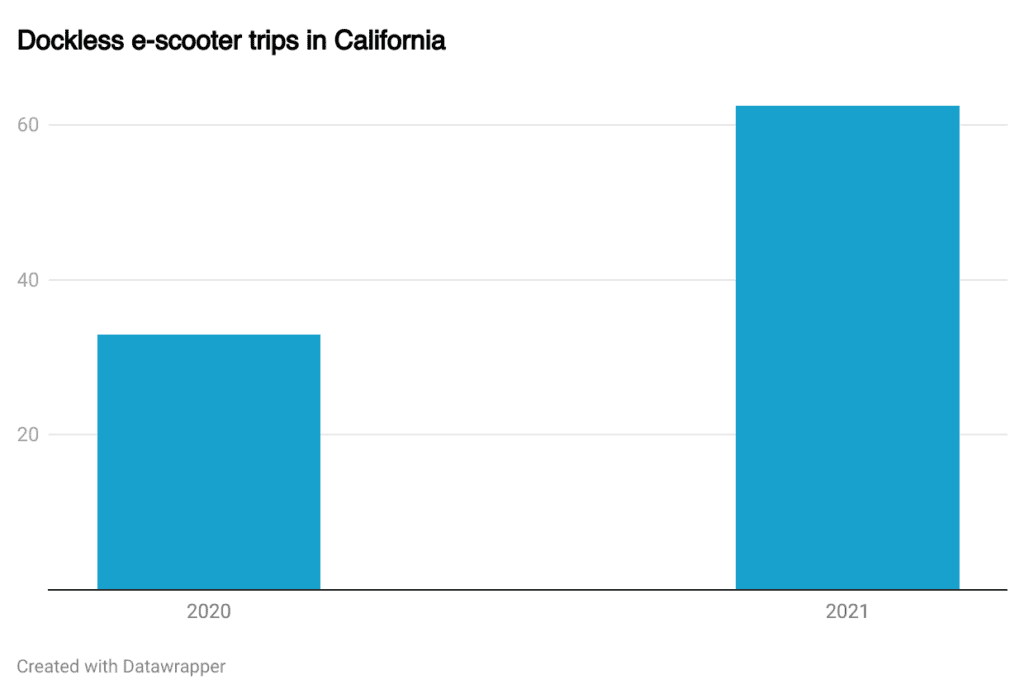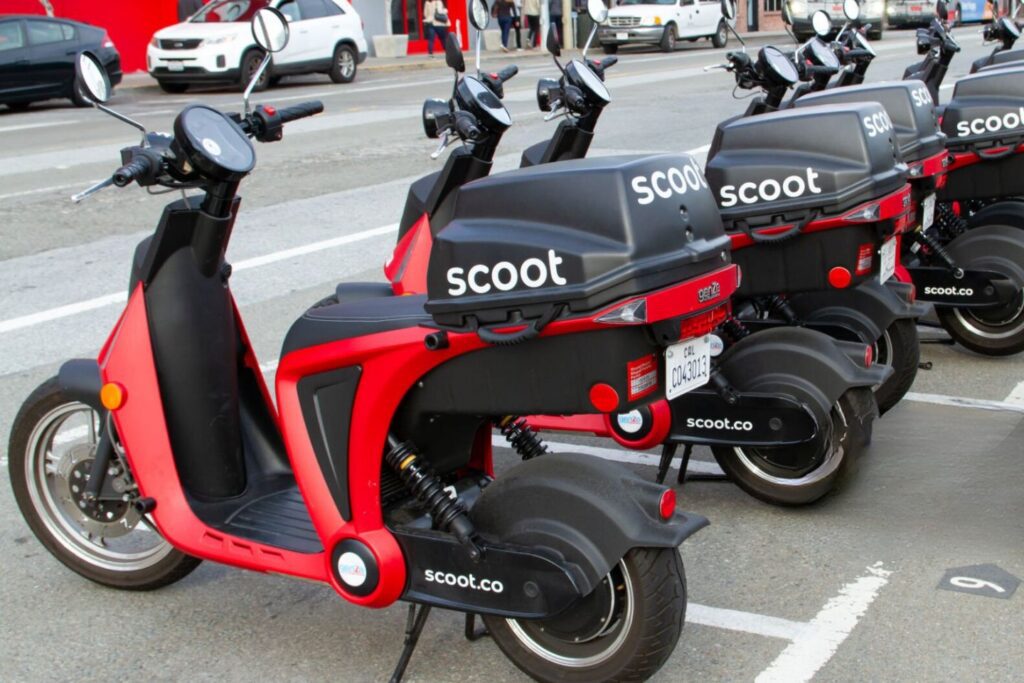Scooters are becoming a popular way to get around in California, offering an easy ride through busy streets and along peaceful beach paths. The number of scooter rides jumped from 33 million in 2020 to 62.5 million in 2021, showing just how much people are starting to rely on them. With more scooters on the road, it’s essential to know CA scooter laws that keep riders, walkers, and everyone else safe.
You need to be aware of existing scooter laws in California to make sure you don’t run into any trouble with the authorities. It is also important to understand the laws around scooter riding in California so that you can protect yourself from any unforeseen consequences.
This article will cover everything from the scooter laws you need to follow, to how to find legal assistance if you run into trouble or have an accident.


Understanding CA Scooter Laws
California’s DMV provides a complete list of scooter laws that apply in the state. The legislation covers a wide range of regulations, from helmet requirements for riders under a certain age to speed limits and designated riding areas.
Electric Scooters vs. Manual Scooters
In California, you need a driver’s license or a learner’s permit to ride an electric scooter because it’s important to know the rules of the road. If you’re using a manual scooter, which you push yourself, you don’t need a license. This makes manual scooters a great option for pretty much anyone who wants to ride one.
Age Requirements
You have to be at least 16 years old to ride an electric scooter in California. This rule helps make sure that riders are mature enough to handle riding safely in traffic and understand the responsibilities of being on the road.
Moreover, If you’re under 18 and riding any kind of scooter, electric or manual, California says you must wear a helmet. This law is all about keeping young riders safe from head injuries, which can be really serious if you fall or crash.
Parking Regulations
In California, scooters must be parked in designated areas to avoid obstructing pedestrian pathways, doorways, and emergency exits. Illegal parking can lead to fines and even the impounding of the scooter. You should familiarize yourself with and respect local parking rules and regulations, ensuring your scooter does not pose a hazard to others.
Visibility Gear
To enhance safety, especially under low light conditions, wearing visibility gear is highly recommended for scooter riders in California. This includes wearing brightly colored clothing and reflective materials that make the rider more visible to drivers and pedestrians.
Additionally, equipping scooters with the required lighting—such as a white light on the front and a red light on the rear—further increases a rider’s visibility at night, reducing the risk of collisions.
Road Usage Laws
Scooters aren’t allowed on sidewalks in California because it’s safer for walkers. Instead, you’re supposed to ride in bike lanes or on streets where cars go 25 mph or less. This helps everyone get along better and keeps the roads and sidewalks safer for everyone.
There’s a speed limit of 15 mph for electric scooters. This rule is there to make sure that you’re going at a safe speed, so you can avoid crashes and keep in control, especially when you’re around cars and people walking.


CA Scooter Riding: Safety Protocols and Equipment Guidelines
Adhering to safety guidelines and using the proper equipment are important aspects of scooter riding in California. The CA scooter law asks riders to have functional brakes, lights, and reflectors for nighttime visibility.
State-Approved Helmets
Wearing a state-approved helmet while riding a scooter in California is an important practice for protecting yourself from serious head injuries. Helmets used by riders should meet specific safety standards set by the state, ignoring which can lead to legal consequences with the authorities. You must ensure that your helmet fits correctly and is properly secured at all times during the ride to protect yourself from accidents and legal trouble.
Maintenance and Inspection
Regular maintenance and inspection of scooters are vital for ensuring they remain safe and operational. This involves checking the scooter’s brakes, tires, lights, and battery life to prevent malfunctions that could lead to accidents.
These accidents can result in legal difficulties including fines and penalties with CA’s strict scooter laws. Performing routine inspections can identify potential issues before they become serious, ensuring the scooter is in optimal condition for safe riding.
Insurance Requirements
Even though California doesn’t say you must have insurance to ride a scooter, it’s a good idea to consider it. Liability insurance can help cover costs if you’re ever in an accident that’s your fault including paying for damages, medical bills, and any legal issues. This can protect you from financial damage and support you in getting the best legal support for your case.
Legal Implications of Scooter Law Violations
In California, scooter riders are held to the same standards as car drivers, meaning adherence to traffic laws is a must. Not following these laws can lead to penalties such as fines, points on your license, or the loss of your scooter.
Traffic Violations for Scooter Riders
Just like motorists, scooter riders in California must follow all traffic laws, including obeying traffic signals and speed limits. Violating these laws not only puts everyone on the road at risk but also could result in fines, points on your driving record, or even having your scooter impounded. It’s crucial to understand that if you’re involved in an accident on your scooter, the same principles apply as if you were driving a car or motorcycle.
Moreover, consistent violations can escalate to more severe consequences, such as increased insurance premiums or the suspension of your driving privileges. Educating yourself on these laws can significantly reduce the risk of inadvertent violations and enhance the safety of all road users.
Understanding Accidents and Liability
Determining liability hinges on negligence and adherence to traffic laws in scooter-related accidents. If you violate a law, you may be liable for damages which can bear a burden on your pocket. Conversely, if another party’s negligence causes an accident, you can ask for compensation through legal channels. Understanding common types of personal injury accidents can help you know your rights better.
This knowledge is crucial for effectively navigating the aftermath of an accident, including negotiating with insurance companies or pursuing legal action.
If you’ve been involved in a scooter accident, The Personal Injury Center can connect you with experienced lawyers who specialize in scooter and traffic laws.
Minors and Scooter Laws
California places specific legal requirements on minors who ride scooters, including wearing helmets and adhering to age restrictions. Failure to comply with these laws can result in fines for either the young rider or their guardians. Both minors and their guardians need to be well-informed about these regulations to ensure safe and lawful riding practices.
Additionally, engaging minors in educational programs about road safety and responsible scooter usage can reinforce the importance of these laws. Guardians can demonstrate the proper way to wear helmets, navigate traffic, and respect the rules of the road, ensuring the safety and legal compliance of young riders.
Understanding Local Ordinances
While California sets the statewide legal framework for scooter riding, local municipalities may have their specific ordinances that scooter riders need to follow. These can include restrictions on where scooters can be parked, areas where riding is prohibited, and local helmet laws that may be more stringent than state requirements. Familiarizing yourself with the local laws in your area can help you avoid unintentional violations and fines.
How to Connect with Legal Experts
Connecting with legal experts is important if you are seeking advice or facing legal issues related to scooter use. While there are many platforms (online and offline) that offer legal services, you may need help with these different options. Once you are sure you need legal support, it is best to connect with an organization that can match you with credible legal experts in your required area.
When to Seek Legal Help
You should seek legal assistance immediately if involved in an accident or cited for a scooter violation. Legal expertise is important for navigating the aftermath of incidents and securing your mental and financial health. Understanding your rights and potential liabilities early on can significantly impact the outcome of the law case. A timely consultation can prevent unnecessary complications and ensure your interests are protected under the law.
Finding the Right Lawyer
You also need to choose a lawyer with experience in traffic and scooter law when faced with a legal scooter issue. Look for someone familiar with local regulations and with a track record of success through testimonials and reviews. Personal recommendations and professional reviews can guide you to a trustworthy legal advisor who can help you solve your legal problem easily.
If you need legal advice or representation related to scooter use, don’t hesitate to reach out to The Personal Injury Center. Our team of experienced lawyers specializes in scooter and traffic laws, ready to assist you with any issues or questions you might have.
Key Takeaways
|
FAQs
Do you need a license to drive a scooter in California?
Yes, you need a valid driver’s license or learner’s permit to ride an electric scooter in California.
Can you ride a scooter on the road in California?
Yes, you can ride a scooter on the road in California, but it’s best to use bike lanes or roads with a speed limit of 25 mph or lower for safety.
Can you ride an electric scooter on the sidewalk in California?
No, you cannot ride an electric scooter on the sidewalk in California. It’s for pedestrian safety.
Is it illegal to ride a scooter without a helmet in California?
Yes, it’s illegal for anyone under 18 to ride a scooter without a helmet in California. Helmets are required for safety.
What is the speed limit on electric scooters in California?
The speed limit for electric scooters in California is 15 mph to ensure the safety of the rider and those around them.



